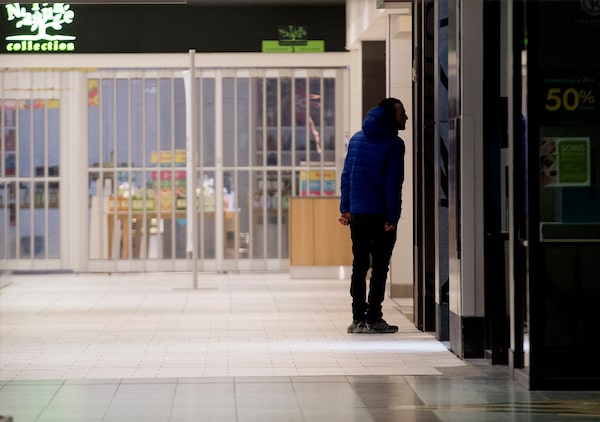
A man looks in the window of a closed store at a shopping mall in downtown Montreal on March 22, 2020.Graham Hughes/The Canadian Press
Prime Minister Justin Trudeau has promised $5-billion in credit for hard-pressed farmers and will hold talks with the premiers Monday to look for additional ways to assist small-business owners struggling to cope with the economic fallout from the COVID-19 pandemic.
Mr. Trudeau told his daily news conference that farmers and people working in the agri-food business are facing difficult times and that Ottawa is prepared to offer a helping hand.
“We are opening up $5-billion in additional lending capacity. Starting today, farmers and producers can apply to Farm Credit Canada for the support they need to keep food growing and get it on to our tables,” he said.
Mr. Trudeau said he will host a conference call with the premiers and territorial leaders to discuss the continued co-ordination of quarantine and self-isolation, including providing medical equipment.
“The premiers and I will also talk about continuing to move forward with measures to support families and small businesses to ensure our economy rebounds,” he said.
A report released Monday warns of the economic consequences if mitigation measures such as social distancing and travel bans stay in effect until the end of August. The Conference Board of Canada’s forecast said the country’s real GDP could fall 1.1 per cent in 2020.
“These are extraordinary times. Canadian leaders, business owners and households are facing unprecedented uncertainty," said Pedro Antunes, the Conference Board’s chief economist. “If this scenario holds true, we can expect a deeper and longer-lasting hit to the Canadian economy. Still, governments have acted swiftly to mitigate health and economic impacts," he added. “Once COVID-19 is contained, the economy will rebound.”
The Conference Board estimates that in that end-of-August scenario, the economy could shed 330,000 jobs over the second and third quarters and the jobless rate could climb to 7.7 per cent. The resource sector, tourism and household services will be hit the hardest, the board said, warning they could suffer double-digit declines.
The report says the United States would face a consumer-led recession, with real GDP declining 1.1 per cent. Canada’s exports, which mostly flow to the U.S., could drop 2.1 per cent.
Two former senior Finance Department officials, Scott Clark and Peter DeVries, said Canadians should expect a government deficit of $93.9-billion for 2020-21 – but warned it could be even larger if the pandemic persists into the second half of the fiscal year.
“This could add another $55-billion to the deficit. A deficit of $150-billion (6 per cent of GDP) or higher is very possible,” they wrote in an online post. “But this is a manageable deficit. It is a cyclical deficit, not a structural deficit. It can be eliminated relatively quickly once the COVID-19 is halted in Canada and other countries, the global economy and domestic economy begin to recover and temporary anti-virus policies are removed."
Provinces and cities across the country have already declared states of emergencies that limit gatherings and provide authorities with the power to fine people who ignore social-distancing rules.
Mr. Trudeau is also scheduled to speak with Japanese Prime Minister Shinzo Abe and Ethiopian Prime Minister Ably Ahmed Monday.
Also Monday, G20 finance ministers announced they are working on a co-ordinated plan to support the global economy and assist developing countries.
French Finance Minister Bruno Le Maire summarized the agreement via a statement on Twitter following the call. He said the finance ministers confirmed the coronavirus has had a “violent” impact on the world economy and said the group agreed to “preparations for a common exit strategy from the crisis.”
Parliament is being recalled Tuesday to pass emergency aid legislation to help people who have been forced to stay home and to provide assistance to businesses.
Last Wednesday, Ottawa announced $27-billion in emergency aid for workers and businesses and $55-billion in tax deferrals. The aid for workers included future increases to the Canada Child Benefit, the GST credit, a 10-per-cent wage subsidy to help employers retain staff and two new programs worth a combined $15-billion that are meant to provide short-term income for Canadians who do not qualify for employment insurance.
Several business groups are urging the government to increase the wage subsidy so companies can retain workers, as Denmark has done, rather than laying them off and forcing them to turn to the employment insurance system.
Miles Corak, a leading expert on EI who served as economist-in-residence with the federal government in 2017, published a series of recommendations Sunday on what Ottawa should do next. Prof. Corak, who teaches economics at the Graduate Center of the City University of New York, praised the design and speed of the initial package of measures and the fact that it focused on Canadians who do not qualify for EI.
The current program offers as much as 55 per cent of insurable earnings up to a maximum income of $54,000, which works out to $573 per week. Prof. Corak said the maximum income should be increased to $75,000 and the replacement percentage should rise to at least 75 per cent. He also calls for eligibility rules – which vary by region based on the local unemployment rate – to be lowered to a uniform level based on the least stringent requirements.
“For now you should continue to maintain the maximum duration of benefits and adopt a wait-and-see approach,” he wrote in a blog post. “When people come close to exhausting benefits, you will know about it and can increase the duration at that time if necessary.”
Sign up for the Coronavirus Update newsletter to read the day’s essential coronavirus news, features and explainers written by Globe reporters.
 Robert Fife
Robert Fife Bill Curry
Bill Curry